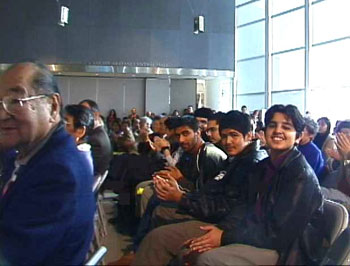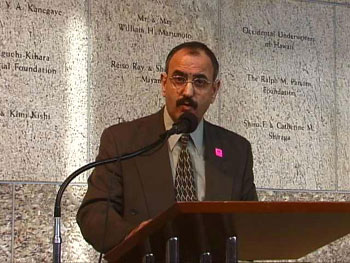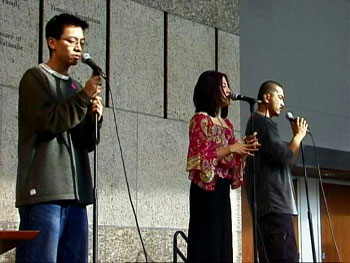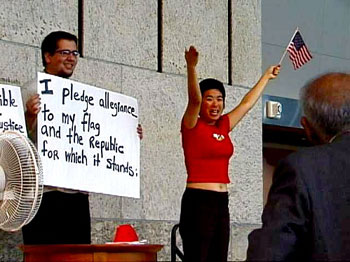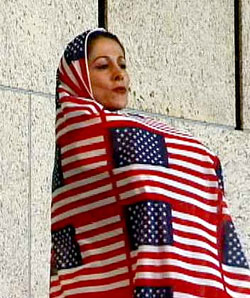 Home | Who We Are | Past Events | Open Forum | Campaign for Justice | Contact Info | Membership | Links | Search |
||||
 Home | Who We Are | Past Events | Open Forum | Campaign for Justice | Contact Info | Membership | Links | Search |
||||
|
By ELLEN ENDO
Over 300 filled the JANM George and Sakaye Aratani Central Hall in Little Tokyo for the two-hour program that mixed speakers and performances and also honored redress activist Isamu Carlos Arturo “Art” Shibayama and the Korean Immigrant Works Advocates (KIWA). Tritia Toyota and Christina Shigemura co-hosted. Shibayama, recipient of this year’s Fighting Spirit Award from the Nikkei for Civil Rights and Redress (NCRR), is challenging the U.S. government in a lawsuit, Shibayama v. Reno, in an ef-fort to obtain reparations on behalf of Japanese Latin Americans affected by the wartime hysteria. KIWA’s ongoing efforts to empower Korean immigrant workers were rec-ognized with the Pacific Southwest Japanese American Citizens League’s Community Achievement Award. Speakers and performers linked the Sept. 11 terrorist attack and the WWII internment, but a group of young ac-tors, known as Zero 3, Performance artist/character actor Shida Pegahi, and a stage artist named Denise Uyehara managed to bring the day’s commemorative events to an emotional peak with their dramatic interpretations. Zero 3’s Kennedy Kabasares, Traci Kato-Kiriyama, and Edren Sumagaysay revisited their per-sonal Sept. 11 experiences, while Ms. Uyehara’s blended wit and pathos to ex-plore issues facing Nikkei, Arab Amen-cans -and Muslims. The world cannot be divided into two societies, one for rebels and one for the officers of the law,” reminded keynote speaker Michel Shehadeh, Western Regional Director of the American-Arab Anti-Discrimination Committee (ADC). Calling the internment of persons of Japanese ancestry “a classic case of unlawful racial profiling,” Shehadeh said he looks to the Japanese Ameri-can experience for inspiration. “They found the strength to cling to hope.” ADC is a civil rights organization committed to defending the rights of people of Arab descent. Shehadeh is one of the “LA 8,” eight Palestinians and one Kenyan arrested in 1987 for their alleged affiliation with the Popu-lar Front for the Liberation of Pales-tine (PFLP). No criminal charges have ever been filed against them. Since then, the eight have successfully fought off government efforts to deport them.
Keynote Speaker: Michel Shehadeh
ADC is a civil rights organization committed to defending the rights of people of Arab descent and promoting their rich cultural heritage. ADC, which is non-sectarian and non-partisan, is the largest Arab-American grassroots organization in the United States, It was founded in 1980 by former Senator James Abourezk and has chapters nationwide. ADC is at the forefront combating defamation and negative stereotyping of Arab Americans in the media and wherever else it is practiced. In doing so, it acts as an organized framework through which Arab Americans can channel their efforts toward unified, collective and effective advocacy; by promoting a more balanced U.S. Middle East policy and serving as a reliable source for the news media and educators. By promoting cultural events and participating in community activities, ADC has made great strides in correcting anti-Arab stereotypes and humanizing the image of the Arab people. In all these efforts, ADC coordinates closely with other civil rights and human rights organizations on issues of common concern. Shehadeh is also one of the “LA 8,” eight Palestinians and one Kenyan arrested in 1987 for their alleged affiliation with the Popular Front for the Liberation of Palestine (PFLP), contraband for its association with “international communism, ”which later became referred to as ”international terrorism.” The LA 8 are all accused of engaging only in legal political activities which are protected by the First Amendment. No criminal charges have ever been filed against them. Since then, the eight have successfully fought off government efforts to deport them. A U.S. immigration judge has ruled that if the Justice Department wishes to proceed with the deportations of two of the LA8, long time legal residents Khader Hamide and Shehadeh, it must do so under the McCarran-Walter Act charges under which they were first arrested. Since these laws are no longer in effect, it is clear that any further attempt to deport any of the LA 8 would be nothing more than persecution.
September 11, 2001 changed all of our lives. For some of us, Sept. 11 has brought back memories of our own communities experience after December 7, 1941- Pearl Harbor. In order to never forget the injustices perpetrated on Japanese Americans by the U.S. government, Japanese American communities nationwide hold Day of Remembrance events to remember Executive Order 9066, signed on February 19, 1942, and the ensuing violations of civil rights. Three performances at DOR linked the Sept. 11 terrorist
Coming off of their successful one-night performance at the UCLA Armand Hammer Museum in december, Zero 3 performed a new spoken word piece focusing on their observation of the media-fueled frenzy after the September 11 attacks. Zero3 is made up of Kennedy Kabasares, Traci Kato-Kiriyama and Edren Sumagaysay. The trio made their debut in April 2000 at the Japanese American Cultural and Community Center’s Fresh Tracks series at the David Henry Hwang Theatre in Little Tokyo. Since then, Zero 3 has been performing in various venues across Southern California including the Vogue Theatre in Hollywood, the Natural History Museum in Los Angeles and Highways Performance Space in Santa Monica.
Denise Uyehara performed an excerpt from her work-in-progress, “Big Head”, which explores racial profiling of Japanese Americans, Arab Americans and Muslims during times of crisis. Uyehara is an award-winning performance artist and writer whose work has been presented in the U.S., London, Vancouver, Helsinki, Tokyo and Hairou in China. She was recently a Poets & Writers resident artist at the Los Angeles County Museum of Art and Beyond Baroque Literary Center.
Performance artist/character actor Shida Pegahi is a dancer, choreographer and faculty member of the Westside Academy of Dance. She is the artistic director of her own company, Ney Nava Dance Theatre (www.neynava.com) in Los Angeles, which performs contemporary, mystical and traditional Persian dance. Shida has appeared in several plays in her native Farsi. A board of directors member of Levantine Cultural Center, she is a frequent guest on international television talk shows, speaking on Middle Eastern cultures, feminism and dance. Banned in her native Iran since the Islamic Revolution in 1979, Shida continues to keep Persian dance alive while constantly infusing it with new ideas. Her performance piece, ”Chadoor” is written by Iranian poet/multimedia artist Gita Khashabi, and in it one can see the cross-pollination of Muslim/Middle Eastern feminism, dance choreography, poetry and drama. At first “Chadoor” may strike the viewer as anti-Islamic, but Khashabi’s text does not lend itself to simplistic interpretations or soundbytes. Khashabi was born in Iran and came to the United States to study visual arts. She graduated from the Visual Arts program at Cal Arts. Her recent exhibit last November was a poetry and photography montage, ”Alef Ba, ”at Track 16 Gallery, Bergamot Station. |
